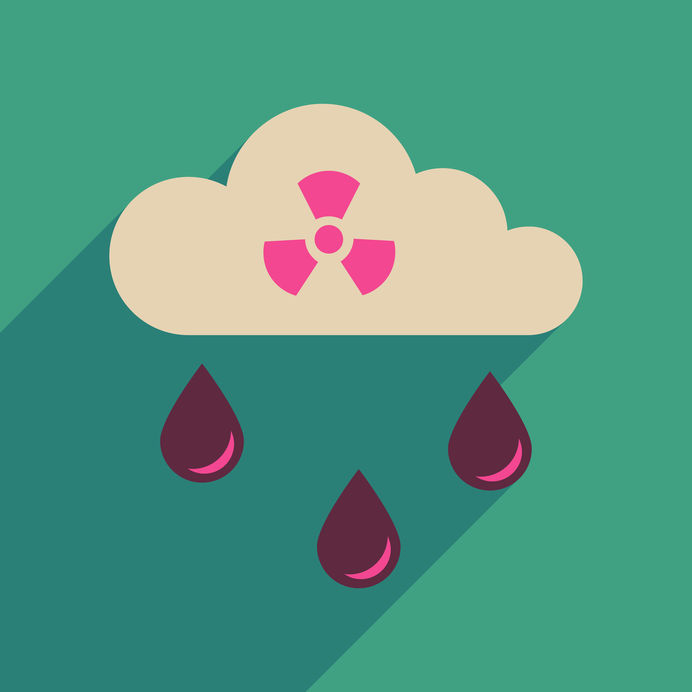Heavy Metals and Thyroid Function

The thyroid gland is a large endocrine gland in the neck that secretes two different thyroid hormones, called T3 and T4. These hormones are responsible for several functions in the body, most of which having to do with metabolism, growth and development. There are many conditions that result from too little thyroid hormone (hypothyroidism) or too much thyroid hormone (hyperthyroidism). Some of them can be autoimmune related (Hashimoto’s and Graves’), where the immune system attacks the thyroid gland, or some conditions can be the result of reactions to other things in the body such as heavy metals, toxins, certain medications…etc. In this post, we will discuss how heavy metals can alter thyroid function and hormone production.
Metals in general have an affinity for the thyroid gland. Iodine, a mineral found commonly in salt, is needed for the thyroid to be able to make thyroid hormone. Without enough iodine, a person is unable to make enough thyroid hormone, and can become hypothyroid. Another important mineral the thyroid needs is selenium. While selenium is not needed directly for thyroid hormone production, it helps to recycle harmful hydrogen peroxide that is made as a byproduct of thyroid hormone production, and it also helps convert the inactive form of thyroid hormone (T4) into the more active form (T3) throughout the rest of the body. Both iodine and selenium are found in most of the foods that we eat, so we often acquire the amounts we need of these minerals in our basic diet. But sometimes, certain things like other metals in the body can cause issues with the amount of iodine and selenium that are available to make healthy thyroid function. The most common metals we see that accumulate in the body that affect thyroid function are arsenic, mercury and cadmium.
Arsenic
Arsenic is a natural component of the earth’s crust, and an environmental toxin that is often used in making glass, pigments, textiles, paper, ammunition and some preservatives and adhesives. It is found most commonly in contaminated groundwater and to a lesser extent food such as fish, shellfish, seaweed, rice and fruit. In high doses in the body, it has many different toxic effects that can at times promote conditions such as diabetes, cancer, liver damage, kidney damage and cardiovascular damage. In relation to the thyroid, arsenic will compete with the binding of selenium, which reduces the amount of available selenoprotein antioxidants, and thereby can cause damage to the thyroid and compromise thyroid function.
Mercury
Mercury is also a natural metal but is not often released on its own. Most of the mercury that we are exposed to environmentally occurs from emissions created when burning coal and other fossil fuels. When these things are burned, mercury becomes airborne and can contaminate waters, where it can build up in things like fish and shellfish. Mercury is also contained in things like thermometers and dental fillings, which, when released, can cause unhealthy exposure to humans. In high doses, mercury toxicity can cause nervous system damage, kidney family, respiratory failure and even death. In the thyroid, mercury has a high affinity for selenium. It has also been linked to several other autoimmune diseases. Mercury binds to selenium and prevents it from forming antioxidant enzymes, which can prevent thyroid hormone formation, much like a selenium deficiency would. Giving higher than normal amounts of selenium (but not too high as selenium can be toxic), can also help to remove mercury from the body and reduce it’s toxic effects.
Cadmium
Cadmium is a heavy metal created mostly from smelting and battery manufacturing. It can also get released through burning fossil fuels like mercury, where it can get into the air and soil. Tobacco leaves are one of the highest plant accumulations of cadmium, so smokers have about 2x the body burden of cadmium compared to non-smokers. Cadmium can also accumulate in the thyroid gland, and results in direct damage to the thyroid tissues with chronic exposure.
There are many ways to test heavy metals in the body. Research suggests that urinary levels of cadmium, mercury and arsenic are excellent markers for exposure to these heavy metals. Identifying levels of these metals is important for planning an appropriate treatment for chelation or detoxification. It is important however to make sure you have a knowledgeable physician on board that can help you understand how to measure and treat levels of toxic metals in your body.
Looking for more information on autoimmune diseases? Get our FREE ebook The 5 Foundations of Autoimmune Diseases, register for one of our FREE online webinars, or check out our blog for additional articles.

